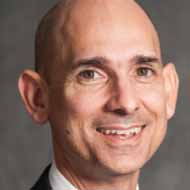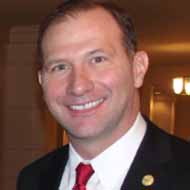 Rep. Greg Bonnen, MD (R-Friendswood)
Rep. Greg Bonnen, MD (R-Friendswood)
As chair of the House Appropriations Committee, Representative Bonnen spent his session focused on the budget. Having one of medicine’s own running that powerful committee proved to be an advantage for TMA’s agenda when it came to the state’s 2022-23 funding.
Budgeteers fully funded the state’s graduate medical education (GME) program at $199.1 million; gave women’s health funding a slight increase to more than $352 million; maintained funding for early childhood intervention services; and provided some key new behavioral health funding, allocating nearly $20 million in new funds to the Texas Mental Health Care Consortium.
“With respect to the budget, we had a great session,” Representative Bonnen told Texas Medicine, noting that the state’s economy and revenue situation looked grim in the throes of the COVID-19 pandemic around summer 2020.
“There was deep concern about how this would turn out, and what’s happened is that we have come out of the recession really strong. We have a budget that is conservative and maintains the state’s commitment to critical services, despite revenues remaining relatively flat. That allowed us to prioritize health care, infrastructure, public safety, and education, both in public and higher education, which would include things like GME, and health-related institutions.
“We also have very extensive funding for mental health throughout the budget. I think health care did really well in this budget cycle – in fact, much better than what was anticipated.”
And then there was Representative Bonnen’s authoring of House Bill 3459, the “gold card” bill that represented medicine’s biggest strike back yet against insurers’ prior authorization burdens. (See “Insurance,” page 24.)
“Apart from the ability of physicians to achieve a status where they can better facilitate their patients getting access to the services they need, I also wanted to make sure that the reviewers that the payers were hiring were Texas physicians that were in the same or similar specialty. I think that’s equally important,” Representative Bonnen said. “That’s very common-sense and practical, yet the health plans, not surprisingly, fought back against it.”
He also authored House Bill 1616, which enables physicians to be part of the Interstate Medical Licensure Compact and gives them the option to be licensed in multiple states.
“Especially with telemedicine becoming more routine and more standard, and with some of the experts that we have in this state that have patients from all over the country … you think of places like MD Anderson [Cancer Center] – this is really a huge help for them to be able to interact with people who are traveling from out of state to come and receive care in Texas. They can now assess them before they arrive [or] follow up with them after they’ve been treated or seen in person.”
One of his unsuccessful medicine-supported measures was House Bill 2929, which sought to better define the state’s law against health plan retaliation for filing a complaint against the health plan. It passed the House but stalled in the Senate. Representative Bonnen says there’s “still a lot of work to be done” in the area of creating more fairness and competition and cracking down on the “predatory practices” of insurers.
 Sen. Dawn Buckingham, MD (R-Lakeway)
Sen. Dawn Buckingham, MD (R-Lakeway)
Shortly after the legislative session ended, Senator Buckingham announced her candidacy for Texas land commissioner in 2022. If this turns out to be her last session as a physician-lawmaker, she made it an accomplished one.
The most potent threat to physician scope of practice this session came in her specialty, ophthalmology. (See “Bad Ideas, Good Results,” page 30.)
“On the scope front, we had a really good session,” she said. “We ended up passing some landmark legislation regarding scope that will ensure [eye] patients are protected while allowing nonphysician providers to practice within their training. We felt really good about that.”
Among the legislative measures she authored, Senate Bill 672 was a huge win, requiring Texas Medicaid to pay for collaborative care services.
“With COVID, we’ve really seen a rise in mental health issues as people have been isolated,” she said. “Getting that hybrid care model that’s been really tried in a lot of states, [and] Medicare is starting to do it – but to integrate that full team so that we’re sure that people are following through, taking their medicines, we have good plans developed, we have … identification of folks so that we can treat them before things can get too severe. We think it’s a huge step for the Medicaid program.”
She also served as the Senate sponsor for the prior authorization “gold card” bill, House Bill 3459 by Rep. Greg Bonnen, MD (R-Friendswood).
“It was a fight that Representative Bonnen and I had been fighting for my entire time in office, and finally got some really meaningful reform there across the threshold, and we’re very excited about that,” Senator Buckingham told Texas Medicine.
She also used her sponsorship to advance telemedicine, cosigning on House Bill 4 by Rep. Four Price (R-Amarillo), which made permanent a number of telemedicine rule relaxations put in place for the pandemic.
“We figured out that it really works well when done correctly. The restrictions that were lifted really allowed telemedicine to become more utilized. We just wanted to maintain that environment so telemedicine can continue to be utilized where appropriate and where [it can] help patients.”
If she’s elected land commissioner next year, she says she’ll still “continue to work as hard as I can to help the patients and physicians of Texas, always.” She urges her physician colleagues to continue playing their role in advocacy and getting involved in TEXPAC, TMA’s nonpartisan political arm.
“It’s just so critically important to have physicians elected, critically important for the physicians in practice to develop and maintain the relationship with their elected officials,” she said. “That is how we get these good changes.
“Do not be confused: The insurance companies and the hospitals and the other health care providers work very hard on their relationships with legislators. Doctors need to be doing the same, always, and of course a minimum of that is participating in TEXPAC. But they need to be meeting and developing relationships with their legislators – and considering running themselves. It’s really important.”
 Sen. Donna Campbell, MD (R-New Braunfels)
Sen. Donna Campbell, MD (R-New Braunfels)
For Senator Donna Campbell, an unusual session that started off with masks, plexiglass partitions, and social distancing “ended up as a very robust session where a lot of good legislation was passed out of the Senate,” she told Texas Medicine.
As a member of the Senate Finance Committee, Senator Campbell was instrumental in helping committee Chair Jane Nelson (R-Flower Mound) pass improved funding for graduate medical education (GME). (See “Medical Education,” page 38.)
That outcome seemed very unlikely at the beginning of the session because of expected COVID-19-related budget cuts, Senator Campbell says.
“We were coming in with a tight budget, but we did put a strong [argument] forward that we needed to keep getting funded,” Senator Campbell said.
But protecting Texans’ medical care also means working against attempts to alter state laws on advance directives. As filed, Senate Bill 917 by Sen. Bryan Hughes (R-Tyler) would have required physicians to maintain life-sustaining treatment on a patient indefinitely until the patient could be transferred elsewhere. The bill ultimately stalled, as did House Bill 2180 by Rep. Joe Moody (D-El Paso), which would have allowed multiple people to simultaneously act as co-medical decisionmakers for another person, with simultaneous authority under medical power of attorney. (See “Bad Ideas, Good Results,” page 30.)
Neither bill adequately took physician or patient viewpoints into account, Senator Campbell says. As a physician, she was able to explain that to Senate colleagues.
“If we’re going to have legislation regarding the end of life there needs to be more collaboration with the stakeholders,” she said. “The bills related to end of life were very polarizing.”
Likewise, Senator Campbell addressed a biennial challenge to medicine: scope-of-practice bills like Senate Bill 735 by Sen. Angela Paxton (R-McKinney), which would have allowed nurse-midwives increased authority to treat and diagnose a patient.
“The excuse [for those bills] is that we need more providers in both the rural areas as well as urban, and we should expand the scope of practitioners to fill these gaps,” she said. “You can’t sacrifice quality that comes with experience as well as academic preparedness just to fill an access hole. We want access but not at the expense of quality.”
Senator Campbell also supported legislation designed to improve practice management, such as House Bill 4 by Rep. Four Price (R-Amarillo), which codified the pandemic-era exemptions that make telemedicine practical for physicians and patients; and House Bill 1919 by Rep. Cody Harris (R-Palestine), which prevents pharmacy benefit managers (PBMs) from steering patients – and their prescriptions – to health care professionals affiliated with the health plan or PBM.
Likewise, she backed important TMA priorities in public health, including co-sponsoring Senate Bill 827 by Sen. Lois Kolkhorst (R-Brenham), which created price caps for insulin so that patients can afford it, and House Bill 133 by Rep. Toni Rose (D-Dallas), which extended post-partum Medicaid coverage from two months to six months. (See “Medicaid,” page 26.)
 Rep. Tom Oliverson, MD (R-Cypress)
Rep. Tom Oliverson, MD (R-Cypress)
Serving his third term in the House, Representative Oliverson earned the historical distinction of authoring the first bill Gov. Greg Abbott signed in 2021. And it was a big one for his physician colleagues: the TMA-prompted House Bill 1445, which adjusted the law to eliminate a coming tax on outsourced medical billing services, an inevitable precursor to passed-down costs to physicians.
Yet another important win for the House of Medicine came via Representative Oliverson’s House Bill 1763, which outlaws pharmacy benefit managers (PBMs) from clawing back “direct and indirect remuneration fees” after the completion of an insurance claim – fees that have drained millions from Texas medical practices.
He tells Texas Medicine his paramount goal coming into the session was to make health care more affordable. So he’s particularly proud of Senate Bill 1137 by Sen. Lois Kolkhorst (R-Brenham), which he cosponsored in the House. Focused on hospital price transparency, SB 1137 requires facilities to disclose “all standard charges for all facility items or services.” And Representative Oliverson’s own House Bill 18 establishes a discount prescription drug program for the uninsured, which he considers to be “monumental.”
“There’s nothing more frustrating to a [physician] than being able to make a diagnosis and realize that the patient is noncompliant with treatment … because they simply can’t afford the treatment,” he said. The current pharmaceutical supply chain, he adds, leads to employers and government entities having “this perverse incentive to focus on rebates” from PBMs, which has led to manufacturers raising the price of medications above their fair-market value.
“HB 18 correctly diagnoses the problem, and then it basically … focuses in on that exact dysfunction and takes advantage of the entire system – as dysfunctional as it is – in a way that maximizes the benefit to everybody who currently doesn’t have access to those rebates, by providing them a substantial rebate on medications that are simply out of reach,” he said. “And we’re talking about life-saving drugs like epi-Pen, insulin, asthma medications, oral diabetic medications, anticoagulants – things that are extremely costly to the patient without the availability of a manufacturer rebate.”
Among bills of his that didn’t pass, Representative Oliverson did his part to advance the discussion around social determinants of health by authoring House Bill 4365 to establish a pilot project to provide Medicaid participants with services to address social factors. Aside from his legislative achievements, Representative Oliverson played a large role in the way the legislature conducted its business this time around when House Speaker Dade Phelan (R-Beaumont) put him in charge of the chamber’s pandemic response.
“When you think about … how prevalent the virus was in our community when we began in January, and even through now – when it’s still around, but much less so – it just speaks to the fact that we acted in a way that … was a great balance,” he said. “We protected people, we were prudent and exercised appropriate and due caution in terms of the way we made some changes. We required masks for a while. We did all the things that you needed to do without going overboard and just literally descending into a knee-jerk response of overconcern and instigating panic.”
 Sen. Charles Schwertner, MD (R-Georgetown)
Sen. Charles Schwertner, MD (R-Georgetown)
COVID-19 left Texas lawmakers with a lot of unfinished business when it comes to medical care, and one of the top priorities was codifying the executive orders that made telemedicine possible during the pandemic, Senator Schwertner told Texas Medicine.
He strongly supported House Bill 4 by Rep. Four Price (R-Amarillo), which did just that with the Texas Medical Association’s support. Senator Schwertner had worked closely with Representative Price in previous legislative sessions to make telemedicine a practical way to treat patients. (See “Telemedicine,” page 32.)
“It’s the future,” he said. “People are getting more and more services via their phone or computer. We have that challenge in rural Texas in particular. But I think this COVID disaster really highlighted the need for maintaining and emphasizing and improving alternative forms of care and communication with health care providers.”
As with every session, Senator Schwertner spent time fighting scope-of-practice bills such as Senate Bill 915 by Sen. Kelly Hancock (R-North Richland Hills), which would have given advanced practice registered nurses (APRNs) the authority to independently prescribe and to interpret diagnostic tests. (See “Bad Ideas, Good Results,” page 30.)
Senator Schwertner says his background as a physician has been invaluable in pointing out the huge training disparity between physicians and other health care professionals, like APRNs.
“I tell my fellow colleagues that when I came out of pharmacy school at age 22 as the youngest pharmacist in Texas, I thought I knew more than doctors,” he says with a laugh. “And then as I went through medical school and training and then into my subspecialty as an orthopedic surgeon, I realized that the more that I know, the more that I don’t know.”
But physicians-legislators like him need support from other physicians via letters and testimony, he says. For instance, TMA provided written testimony from five physicians opposing Senate Bill 735 by Sen. Angela Paxton (R-McKinney), which would have allowed nurse-midwives increased authority to treat and diagnose a patient.
“It’s very important for fellow colleagues to talk to their individual representatives and senators and tell them their stories,” he said.
Senator Schwertner’s physician background also helped with approval of House Bill 3459 by Rep. Greg Bonnen, MD (R-Friendswood), which allows physicians to earn a “gold card” out of insurers’ prior authorization requirements for certain services. (See “Telemedicine,” page 32.)
“It’s what we call a money bill, and those kinds of bills get a lot of attention because you’ve got a lot of lobbyists coming in and saying, ‘Do pass this,’ or ‘Don’t pass this,’” he said. “What I was able to do was communicate with our fellow members and really talk from the boots-on-the-ground perspective of what it’s like to go through this prior authorization and delay, deny, forestall care that happens all the time with patients.”
Tex Med. 2021;117(8):40-43
August 2021 Texas Medicine Contents
Texas Medicine Main Page